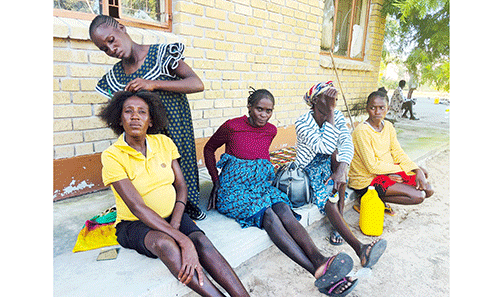ENGELA- The floods in northern Namibia continue to impact the livelihoods of those living around these areas in ways unimaginable. Not only have the floods led to the closure of schools, but the waters have made many areas impassable.
Large parts of the Omusati, Ohangwena, Oshikoto and parts of Oshana regions are under water, and residents have had to move from their houses to high ground.
But bearing the brunt of the floods are more mothers who had just given birth, who are at times forced to wade through flooded plains – often with newborns in their arms – to get home from hospital.
Some of the expectant mothers and those with newborns affected by the floods come from the Ohaingu, Onghala, Ouhongo, Omaninda and Eshoke villages in Ohangwena.
These villages have been flooded, leaving the mothers concerned about how they would get home after giving birth.
Although some houses have not been flooded, the surrounding roads are submerged, making it difficult to pass through.
This is especially true for expecting mothers and mothers with newborns at Engela-Ewalanda.
Many of them live at the Ewalanda maternal waiting ward, located outside the Engela district hospital in the Ohangwena region.
The waiting ward accommodates women who live far from the hospital to cut down on travel time when delivery time draws near.
When discharged from the facility, walking through these flooded plains and oshanas has become a norm.
The mothers described this situation as highly risky, as it increases the chances of falling into the water.
Alina Simon from Ohaingu village said two of her friends from the village had already left the ward, and alerted her about the deep water they encountered.
“They walked through the water with their babies. The water level continues to rise as the floodwater flows in from Angola,” she added.
Simon stressed that they are living in constant fear due to the floods.
“Imagine waiting to deliver, yet you are still worried about how you would cross the deep water with a newborn baby. It’s not easy to be a mother,” she emphasised.
Simon said there are eight women from her village currently at Ewalanda, waiting to give birth.
She emphasised that while their houses are flooded, the real problem lies in the roads, which are submerged in water.
Rauna Johannes from Ouhongo expressed the difficulty for a woman who had just given birth, yet still needs to cross the flooded waters.
“Some roads have holes, and there is a risk of falling in,” she said.
Johannes has requested that the health director’s office provides a helicopter for safe transportation to their homes.
Last week in the Kunene region, a 34-year-old woman and her one-year-old daughter tragically drowned while attempting to cross floodwaters on their way to a clinic.
Another expectant mother, Wilka Hatutale from Epolo in Angola, shared that she has no way of getting home after giving birth because her house is flooded.
“I came to Ewalanda to stay near the hospital, as we don’t have one in Angola,” she said.
The Engela District Hospital has been providing medical services to many Angolans because it is located close to the Angolan border.
Meanwhile, the mothers have also expressed frustration with the overcrowded ward, where they often have to sleep on the floor.
Despite the mattresses and beds provided, they are not enough to accommodate the growing number of women coming in daily.
Sometimes, they are forced to give birth in the bushes while on their way to the maternity ward.
A reliable source revealed that this year, 18 women have given birth on their way to the maternity ward.
Approached for comment, the newly- appointed health director of the Ohangwena region Robert Nandula stated that he did not have much information about Ewalanda, but would send a team as soon as possible to assess the situation.
Meanwhile, newly-appointed Minister of Health and Social Services Dr Esperance Luvindao emphasised that no woman should die while giving birth.
She made these remarks during a visit to Katima Mulilo on Monday.
Luvindao pledged to ensure quality medical services for expectant mothers.



